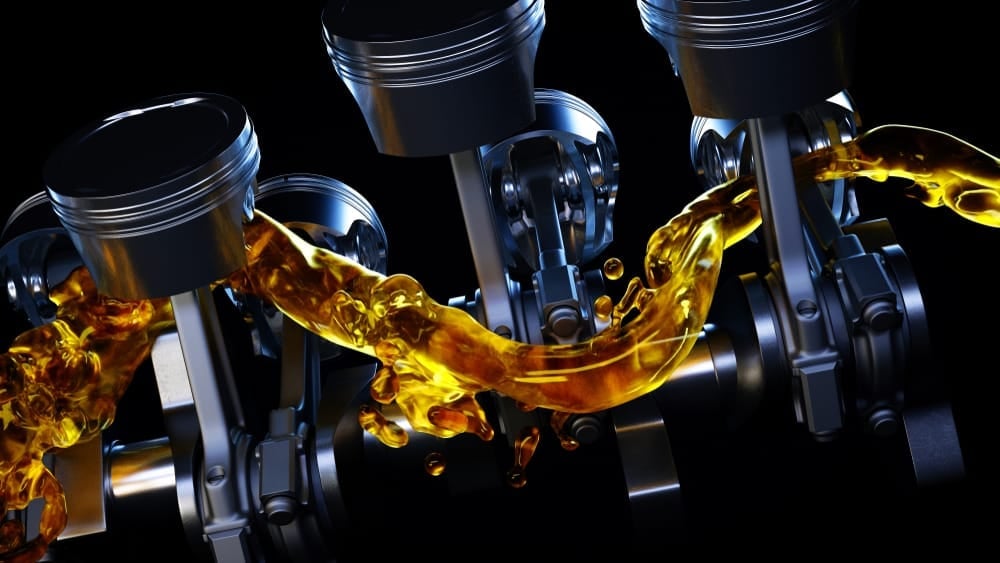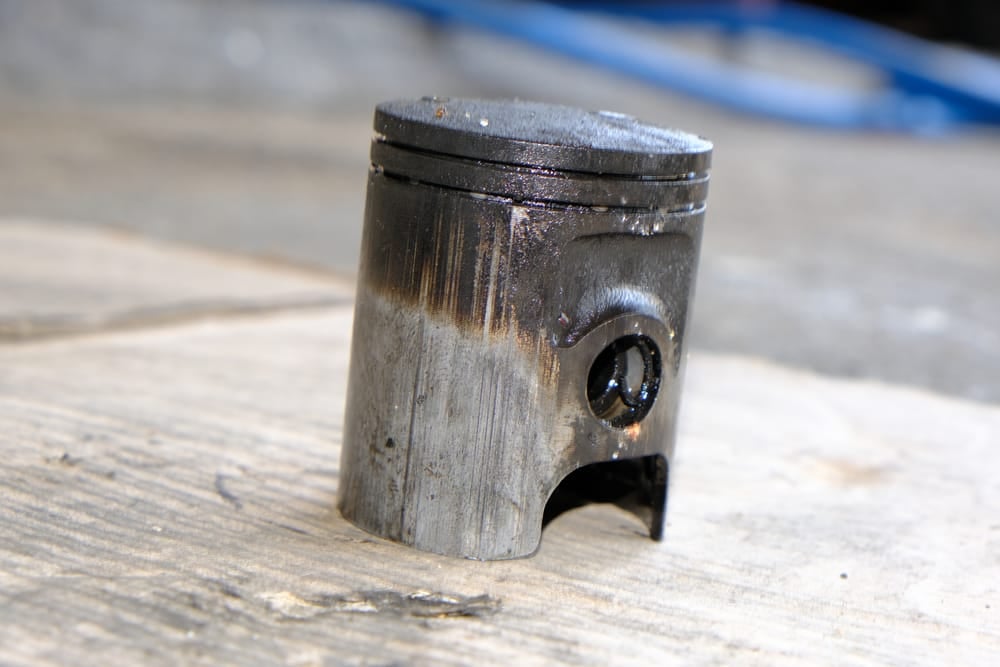
Motor oil is vital for an engine's operation. It lubricates the engine
parts, cools the engine, and helps keep the engine's internals clean.
Without oil, a car will not run for very long. Instead, it will start
and run for a short while before the engine completely quits and
catastrophic engine damage occurs. If you're lucky, a car may run for a
few minutes, but it'll likely fail in under 60 seconds.
Below we go over the importance of engine oil and why you should never run
your car without it.
 An engine running without oil will suffer catastrophic damage very quickly.
An engine running without oil will suffer catastrophic damage very quickly.
Why Do Cars Need Oil?
Cars primarily need motor oil to lubricate their engine's moving
internal metal parts. It reduces friction to keep components from
wearing out. It also aids the cooling system by transferring the heat
from the engine to the oil pan for dissipation. The additives in motor
oil prevent deposits and clean your engine, so it operates smoothly.
Engine oil also picks up the debits lining it for removal.
Here's how it does it:
Lubricates Moving Parts
The main purpose of motor oil is to lubricate the engine.
For example, the piston rings slide up and down along the cylinder bore,
sometimes up to 1000 times a minute!
The engine oil provides lubrication to minimize the wear between the rings
and cylinder bores.
It also acts as a protective layer over the engine components to prevent
corrosion.
Keeps The Engine Cool
Oil is also needed for cooling the engine.
While the cooling system provides most of the cooling your engine needs,
oil provides supplemental cooling to areas where the coolant can't reach.
As the oil circulates throughout the engine, it absorbs heat from the
components it comes in contact with.
It brings the heat to the oil pan, from where it is dissipated.
Reduces Buildup
Motor oils contain additives like viscosity improvers, cleaners and
detergents, and friction modifiers that prevent buildup in your engine.
When it operates, a car engine produces carbon byproducts such as sludge,
varnish, and tar. As a result, they start depositing inside the rings,
cylinder walls, and bearings and grind against each other.
The additives in the oil bond with these carbon substances and prevent them
from depositing inside the engine.
Cleans The Engine
Besides preventing deposits, oil is also helpful in cleaning the engine.
It circulates throughout the engine, capturing debris like metal fillings
and other harmful deposits so they cannot harm the engine's inner workings.
The oil filter removes the debris as the engine oil is pumped through.
 A piston with extreme wear.
A piston with extreme wear.
What Happens To A Car Running Without Oil?
A car running without oil will quickly fail. When there is no oil to
dissipate heat and prevent metal-on-metal contact, the engine parts rub
against each other, causing extreme wear. Ultimately, the engine fails.
Sometimes explosively.
Here's what will happen:
-
Also known as main bearings, engine bearings support the crankshaft as it
rotates. If they do not receive proper lubrication, your car may succumb to
the most catastrophic engine problems - seized bearings.
-
The camshaft is responsible for controlling the valves, by way of lobes,
that let the air and fuel into the combustion chamber and let the exhaust
out. The lobes need a steady flow of oil or will prematurely wear.
-
The cylinder bores are where the piston moves up and down to compress the
air-fuel mixture for combustion. The piston's rings slide against the cylinder bore and, combined with
engine oil, create a seal to prevent combustion gasses from escaping
alongside the piston. With insufficient oil, these rings will wear against the cylinder bore
walls, and the cylinder bore walls themselves will wear prematurely.
What Are Signs Of Low Engine Oil?
If your car is running low on engine oil:
- your car may emit loud noises
- the oil pressure light will turn on
- the temperature gauge will rise
- the fuel economy will drop
- a burning smell
- run or idle roughly
A car engine relies on a closed-loop lubrication system to supply motor oil
to its vital components. It travels from the oil pan through the inlet
circuit, oil pump, pressure relief valve, oil filter, and oil galleys
before draining back into the oil sump.
When the motor oil level in your car falls lower than the oil pump, it
won't be able to supply the lubricant to the other parts of the engine.
This condition is called oil starvation.
If an engine suffers from oil starvation, even momentarily, it will have
catastrophic consequences.
Here are some signs to help you avoid these disastrous consequences:
Strange Noises
Any strange noises coming from under your hood can be a sign of low engine
oil. Here are some sounds that should worry you if you haven't recently
checked the oil level in your car:
-
Clicking
- A clicking noise heard from the top of the engine is made by the
engine's valves when the oil volume or pressure is low.
-
Tapping - The oil pressure also drops when the oil level is low. This
may cause the hydraulic tappets to emit a tapping noise.
-
Knocking
- The next noise you should be wary about is the knocking sound heard
towards the bottom of the engine. It may be because the connecting rod
bearing has run dry of lubrication.
-
Rumbling
- A rumbling or thumping sound may be heard when the crankshaft rubs
against the bearing surfaces. You should immediately cut the engine and
call for a tow when this sound is heard.
-
Clattering
- You may hear a clattering or slapping noise from a cylinder bore.
All of these sounds are a cause for concern. If you hear any of them while
driving, stop immediately and seek assistance.
Burning Smell
Your car's low engine oil level could be because of a leak. Oil leaks from
the engine that land on a hot surface will give off a bad smell.
High-Temperature Alert
When the temperature gauge needle starts rising, you know something is
wrong with your car.
If there is little oil, the metal parts won't be lubricated. The friction
between them raises the temperature inside the engine.
Oil also helps dissipate heat by absorbing it from the engine components.
When insufficient oil is circulating in the engine, the heat won't be
adequately removed.
Low Oil Pressure Light
The low oil pressure light is the most obvious sign of your car's low
engine oil level. If the warning light on your dashboard comes on, you
should immediately pull over and check the dipstick.
If it is low, pour in new oil as soon as possible.
If the low oil pressure light is on and your oil pressure light is on, it
is best to turn off the motor, call a tow truck, and get the vehicle into a
mechanic's shop.
Running an engine with low oil pressure can lead to catastrophic engine
damage and an expensive repair bill.
Conclusion
You should never try to run a car without oil. Without the oil to provide
lubrication and dissipate heat, the metal-on-metal contact will take
seconds to start causing severe damage to the motor and destroying it
within minutes.
If your car is running low on oil, stop immediately, and add oil, or if a
large leak causes the low oil level, you should call for a tow to a
mechanic.